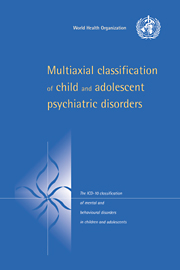 Multiaxial Classification of Child and Adolescent Psychiatric Disorders
Multiaxial Classification of Child and Adolescent Psychiatric Disorders Book contents
- Frontmatter
- Contents
- Introduction
- Axis One (Clinical psychiatric syndromes), page 11 to 98
- (Clinical psychiatric syndromes), page 99 to 176
- Axis Two (Specific disorders of psychological development)
- Axis Three (Intellectual level)
- Axis Four (Medical conditions from ICD-10 often associated with mental and behavioural disorders)
- Axis Five (Associated abnormal psychosocial situations)
- Axis Six (Global assessment of psychosocial disability)
- Acknowledgements
- Index
Axis Two - (Specific disorders of psychological development)
Published online by Cambridge University Press: 05 November 2011
- Frontmatter
- Contents
- Introduction
- Axis One (Clinical psychiatric syndromes), page 11 to 98
- (Clinical psychiatric syndromes), page 99 to 176
- Axis Two (Specific disorders of psychological development)
- Axis Three (Intellectual level)
- Axis Four (Medical conditions from ICD-10 often associated with mental and behavioural disorders)
- Axis Five (Associated abnormal psychosocial situations)
- Axis Six (Global assessment of psychosocial disability)
- Acknowledgements
- Index
Summary
List of categories
No specific disorder of psychological development
Disorders of psychological development
Specific developmental disorders of speech and language
F80.0 Specific speech articulation disorder
F80.1 Expressive language disorder
F80.2 Receptive language disorder
F80.3 Acquired aphasia with epilepsy [Landau-Kleffner syndrome]
F80.8 Other developmental disorders of speech and language
F80.9 Developmental disorder of speech and language, unspecified
Specific developmental disorders of scholastic skills
F81.0 Specific reading disorder
F81.1 Specific spelling disorder
F81.2 Specific disorder of arithmetical skills
F81.3 Mixed disorder of scholastic skills
F81.8 Other developmental disorders of scholastic skills
F81.9 Developmental disorder of scholastic skills, unspecified
F82 Specific developmental disorder of motor function
F83 Mixed specific developmental disorders
F88 Other disorders of psychological development
F89 Unspecified disorder of psychological development
Introduction
The disorders included in F80–F83 and F88–F89 have the following features in common:
(a) an onset that is invariably during infancy or childhood;
(b) an impairment or delay in the development of functions that are strongly related to biological maturation of the central nervous system; and
(c) a steady course that does not involve the remissions and relapses that tend to be characteristic of many mental disorders.
In most cases, the functions affected include language, visuo-spatial skills and/or motor coordination. It is characteristic for the impairments to lessen progressively as children grow older (although milder deficits often remain in adult life). Usually, the history is of a delay or impairment that has been present from as early as it could be reliably detected, with no prior period of normal development. Most of these conditions are several times more common in boys than in girls.
- Type
- Chapter
- Information
- Multiaxial Classification of Child and Adolescent Psychiatric DisordersThe ICD-10 Classification of Mental and Behavioural Disorders in Children and Adolescents, pp. 177 - 196Publisher: Cambridge University PressPrint publication year: 1996


